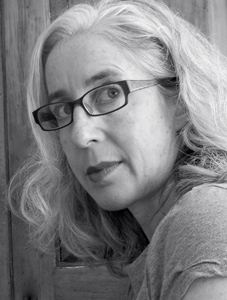Keep Calm and Write Poetry:
Alexandra Handley in Conversation
with Julie Bruck

Malahat volunteer Alexandra Handley talks creative process and contests with Julie Bruck, past recipient of a Governor General's Literary Award and the judge for the 2014 Far Horizons Award for Poetry.
Did you submit to contests like the Far Horizons Award for Poetry when you first began publishing and sharing your work?
Contests were less widespread when I started to send out work, but I did enter some, back when our poems had to be weighed on non-digital balance scales by a live human at the post office. Now that I think about it, there was something satisfying about having to let go of the physical object that way. Perhaps it made it easier to see the work as an entity separate from its maker, and for this reason, made the initial rejections easier to bear.
What do you think writers stand to gain from participating in contests?
Participating in contests shares a common purpose with submitting work to journals or magazines. A poem is, after all, a gesture of communication and it needs at least one reader to complete itself. Preparing work for potential publication is also an important stage in the writing process, since it's when we must really bear down on the difference between our intentions for the words on the page, and what a reader is likely to experience. Finally, contests can toughen our hides, teaching us to carry on when we don't find our work on the shortlists, which happens to everyone.
You are a teacher at The Writing Salon in San Francisco. Has teaching offered you new perspectives on writing poetry?
My students have and continue to teach me through their example. In the classroom, I emphasize the importance of surprising oneself during the writing process, and how that manifests itself as surprise and engagement for the reader. I encourage my students to try different angles of approach, and often nudge them just beyond their comfort zones. Watching them make discoveries during writing and revising helps keep me honest, and makes it harder to stay complacent and habit-bound in my own practice.
How will your experience as a teacher affect your role as judge?
Teaching has sharpened my ability to tease out what's nascent or latent in a poem, what the poem might be reaching for, even if it hasn't quite found itself. It's made me a more sympathetic reader, though that's less helpful for contests, when one must eventually draw lines in the sand.
What will you look for in a winning poem?
I'll look for freshness, and for the feeling, as the poem is unpacked, that it couldn't unfold any other way. Rather than being about experiences, such poems are experiences. That's what I always look for in reading, no matter the context.
Do you have any advice for contest applicants?
If you feel you have done the best work you can, brushed its hairs, and sent it out, you already deserve congratulations. Your work and confidence have taken you this far, and if the entry comes back without a ribbon on it, that should not diminish your ambitions for the work. If you feel the piece(s) might need another round at the desk, revise. If not, send it (them) out again. Whatever you do as a writer, persistence is essential. You don't always have to keep calm, but you must carry on.

Alexandra Handley
* * * * * * * *
Read contest details on the 2014 Far Horizons Award for Poetry.









